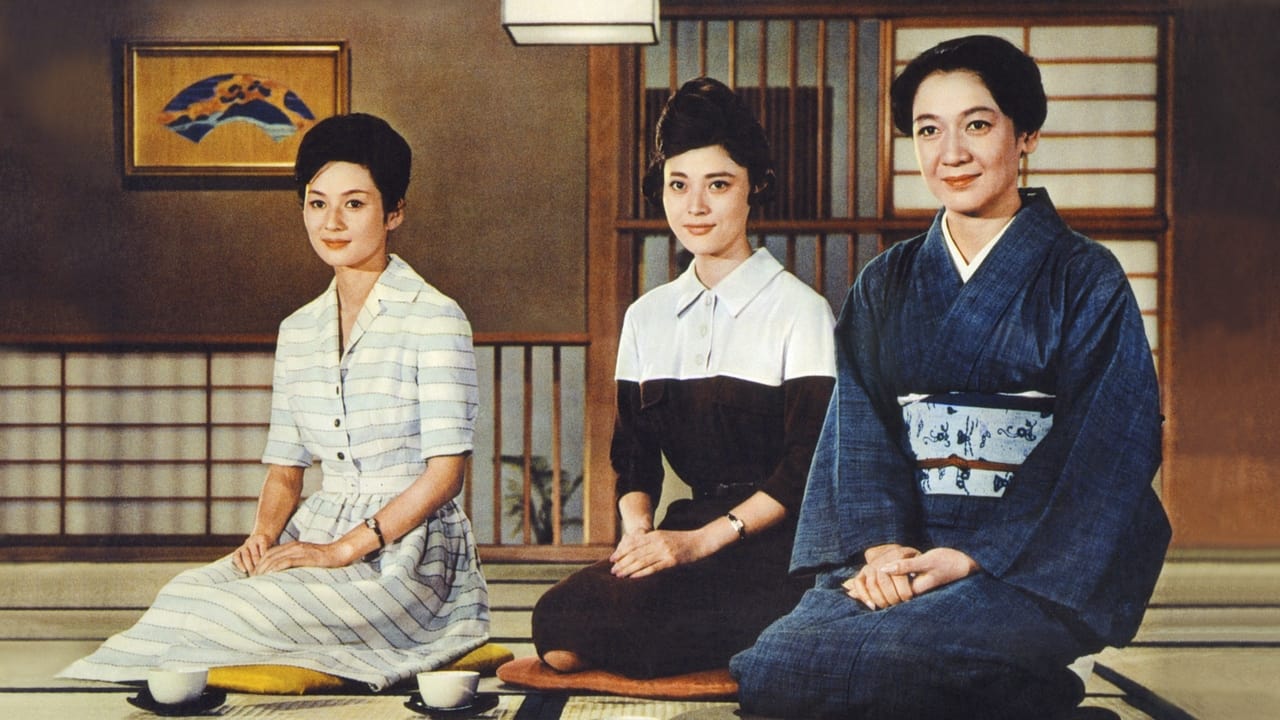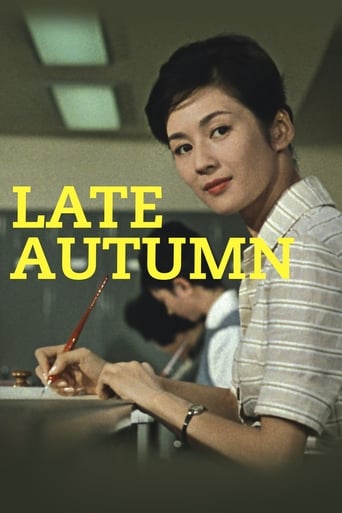

not as good as all the hype
... View MoreA brilliant film that helped define a genre
... View MoreIt's the kind of movie you'll want to see a second time with someone who hasn't seen it yet, to remember what it was like to watch it for the first time.
... View MoreThe movie really just wants to entertain people.
... View MoreIn many ways a retread of his earlier masterpiece Late Spring, which dealt with the relationship between a widowed father and his marry-able daughter, Ozu returned to familiar territory as he often did late in his career for a look at the flip-side. Here, the mother is widowed and desires to see her daughter married and happy. Three friends determine to intervene, leaving a trail of misunderstandings and hurt feelings in their attempt to appease all involved.While this is certainly a familiar story for Ozu to tell, he somehow manages to inject new life into it every time out. Through a beautiful color palette and his famous visual style, Ozu explores a world of postwar Japan that finally appears to be picking itself up fifteen years after World War II. Western dress and behavior continues to seep into Japanese culture and Ozu seems to be picking up on the rapid evolution of change within his country throughout these late career works. His lack of interest in plot and storytelling leaves the viewer more time to focus on the atmosphere, the context in which the story is set. The result is a very pensive and serene feeling as one realizes that no matter what time or place, humans will always desire certain things. Companionship, love and happiness will never go out of style, even for widowed women.
... View MoreI have seen practically every film available that were directed by Yasujirô Ozu. While he's considered by many to be a genius, I would say that he was an ultra-conservative--a man who developed some interesting techniques and story ideas but never really changed with the times. So, if you see an Ozu film from 1935, 45, 55 or the early 60s, there is an amazing sameness about them--something no other director ever accomplished. This is not criticism--this is fact. Ozu did stories about the Japanese family--and very often about widowed parents striving to get their now adult children married. And, his actual techniques didn't vary much. Although "Late Autumn" is in color (a few of his later ones were), it uses the same stationary camera and floor level for the shots. Ozu truly was a man who liked to do variations on the same themes and in the same styles! Because of this, while "Late Autumn" is expertly crafted, it really isn't innovative in the least other than making both the main characters women.This story begins with a memorial service for a man who has been dead for several years. After the service, three friends of the deceased and his widow discuss her as well as her 24 year-old daughter. They love these women and it hurts them to see the daughter is still unmarried despite being a lovely person. So, the three schemers decide that it's their task to get the girl married--whether she likes it or not! Unfortunately, their plans don't always go as they intended and ultimately it takes one of the young lady's friends to give them some assistance.Other than this film be very mildly comic as well as the use of the three friends, the film is yet another lovely and very deliberately paced Ozu film. If you haven't seen too many of his films, then by all means watch this one. If you have and feel you've gone down this same road many times before, they try a film by another fine director. Even die-hard fans would agree that there is an amazing similarity between this and most of Ozu's films--particularly his later ones.
... View MoreThis story is basically a retelling of the excellent "late Spring", except now the always engaging Setsuko Hara plays the mother in the film rather than the daughter. The daughter, the beautiful Ayako played by Yoko Tsukasa, is being told its time to marry. Three friends of her late father (essentially uncles) attempt to arrange a suitable partner for her. Ozu has updated his films before and he always manages to keep them fresh. This time, it is both humorous as well as poignant. A great addition to the story is Ayako's best friend Yuriko, a spitfire who isn't afraid to speak her mind. I especially like the relationship of Akiko (Hara) and Ayako as mother and daughter. They seem very comfortable with each other. In the previous "Late Spring", there was more tension. That is what gives "late Spring" the nod as the better film, it is a masterpiece. In this film the acting is uniformly good to great and there are some standout scenes, especially between the always beautiful, gifted actress Setsuko Hara and Yoko Tsukasa. There is also a great scene between Yuriko and the three men who are trying to find a suitor for Ayako. By all means, watch this film, but don't miss "late Spring". This film is available on the 5 disc "Late Ozu" set and both the film and box set are highly recommended.
... View MoreOne of many great movies by Ozu, this is an apparently simple comedy (a comedy that puts a smile on your face rather than guffaws of laughter) but with depths of feeling and sadness that are, as always with Ozu movies, so unexpected. Although not by any means a 'major' or 'serious' movie, its full of touches that show what a masterly director he was.Arranged marriages have a bad name for many people - I was very surprised on a recent trip to Kyoto to be told that they are still quite common - but this is a movie that shows that they are as full of the complexities and pitfalls of conventional romance. The story revolves around the clumsy attempts of three well meaning men to help out the wife of their late friend by acting as matchmakers for his daughter. Its complicated by the fact that all three of them were in love with the mother in their early years - unsurprising as the mother is played by the always luminous Setsuko Hara. The daughter is less than impressed by the matchmaking, especially when the men decide to set up one of their number with her mother.The plot is in many ways very similar to Ozu's wonderful 'Late Spring', which starred many of the same actors. But while Late Spring was full of thematic richness and drama, this movie is a lot simpler, but is equally bitter sweet at the end. The happiness of the older characters at marrying off the younger generation is matched with an awareness of the loneliness of old age. Its also worth noting that the usual imaginative Ozu camera angles in this movie are matched with gorgeous colour and lovely set design.One point of interest for this movie is that it was clearly intended as a crowd pleaser. For those who think that Ozu is too 'arty', this movie shows why he was hugely popular with ordinary cinema-goers in Japan and remains so to this day. His simple stories resonated deeply with Japanese people at a time of great change, but his genius is in the universality of these movies - they have never truly dated, the are as insightful and fascinating as ever.In summary, this is not a movie in itself that will convince the doubtful about Ozu's right to be considered one of the all time great directors, but it is a delightful movie for any cinema lover (or for that matter, anyone interested in Japanese culture) to enjoy.
... View More